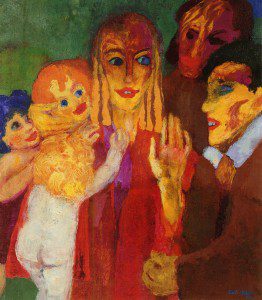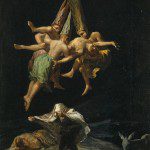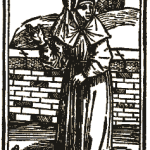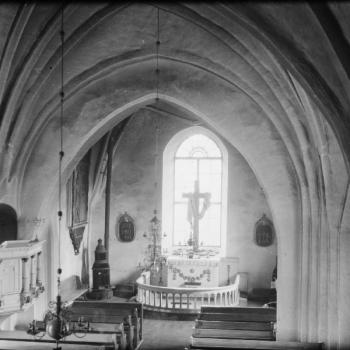
Even among devout Catholics, it’s not uncommon to hear about the “damage” caused by the pope’s occasionally diplomatic language. While not those who would call him “Bergolio” or lambaste the Novus Ordo (for a particularly remarkable example of that, see here) as such, they represent a certain sort of traditionalism that is wary of things not clear-cut, almost Scholastic in their desire to pick out and propound subtle and varied rules. For them, and for many, this pope is not the antichrist, as some would say, but is instead dangerous in his ambiguity, in the multivalent meanings of his words. These accusations most often arise in the context of controversial issues. Communion for the divorced and contraception come to mind.
While I believe with the Church (and Pope Francis!) that the Eucharist should be reserved from those who re-marry and that contraception is unacceptable I still see a lesson to be learned from the pope’s style, if not his actual words. It’s not as if he is incapable of making decisive statements (take for example his persistent ones on the death penalty). Why speak in such a confusing way then? Why befuddle billions of people worldwide?
Well, for one, he’s a man and he himself gets confused sometimes. But something more profound lurks behind even this explanation. The reality is that our faith is complex; we have dogma, but we also have the difficulty of living in a fallen world. Though the Spirit guides us, the Son of Man no longer dwells among us. I’m not speaking here of questions like the Annunciation, the Incarnation, or the like. These are settled, matters of the very faith we hold. Instead, I refer to the problem of living a Catholic life in this world, beset on all sides by temptations, sins, and general depravity.
I’ll give a small example to illustrate my point. If I am fasting (and in the Eastern tradition this means fasting from a variety of things) and I arrive at my non-religious grandmother’s house, should I politely take some food, though it breaks my fast, or nicely tell her I’m fasting and cannot eat what’s before me? On the one hand, it would seem important to continue corporeal mortification. On the other, we do not wish to blow the trumpet before us. In the best case scenario, perhaps I could take a small amount of the forbidden food and do my best not to relish it, but even this is not always possible (we all know grandmas think we’re all wasting away, famished). My instinct is to say: do whatever possible not to impinge on the hospitality of the other, but the point is clear: Catholic life is messy.
And the Gospels tell us just this. Witness Jesus reprimanding his followers:
When they came to the disciples, they saw a large crowd around them and scribes arguing with them. Immediately on seeing him, the whole crowd was utterly amazed. They ran up to him and greeted him. He asked them, “What are you arguing about with them?” Someone from the crowd answered him, “Teacher, I have brought to you my son possessed by a mute spirit. Wherever it seizes him, it throws him down; he foams at the mouth, grinds his teeth, and becomes rigid. I asked your disciples to drive it out, but they were unable to do so.” He said to them in reply, “O faithless generation, how long will I be with you? How long will I endure you? Bring him to me.” They brought the boy to him. And when he saw him, the spirit immediately threw the boy into convulsions. As he fell to the ground, he began to roll around and foam at the mouth. Then he questioned his father, “How long has this been happening to him?” He replied, “Since childhood. It has often thrown him into fire and into water to kill him. But if you can do anything, have compassion on us and help us.” Jesus said to him, “‘If you can!’ Everything is possible to one who has faith.” Then the boy’s father cried out, “I do believe, help my unbelief!” Jesus, on seeing a crowd rapidly gathering, rebuked the unclean spirit and said to it, “Mute and deaf spirit, I command you: come out of him and never enter him again!” Shouting and throwing the boy into convulsions, it came out. He became like a corpse, which caused many to say, “He is dead!” But Jesus took him by the hand, raised him, and he stood up. When he entered the house, his disciples asked him in private, “Why could we not drive it out?” He said to them, “This kind can only come out through prayer [and through fasting].” (Mark 9:14-29)
On the face of it, we have an exhortation to greater faith. But is that quantifiable? Is there some “correct” amount of prayer and fasting His disciples might’ve undertaken to exorcize the boy successfully? No, of course not. There’s no precise rule for how much they ought to have fasted; their faith can be imagined as a mustard seed, but the Lord is not being literal. There is a deeper significance here, a sententia beneath the littera: that we must have faith (reflected in good works) to accomplish anything, that we are enlivened by this faith, that by living it we come to understand. As the maxim of St. Anselm goes: credo ut intelligam (I believe so that I may understand).
Too often we lead with understanding and not belief. We assume our rules and injunctions can solve every pastoral circumstance in which human beings suffer; this, however, is properly the realm of faith, the realm in which we throw ourselves at the foot of the Cross.
If I am being honest, I encounter this problem all the time. I have friends, with whom I am growing in the faith, who come to me with questions. Rarely is there some clear answer; rarely do they come asking “what am I allowed to eat on Fridays,” instead they come crying “how can I treat this person with charity? How can I deepen my prayer life to reflect my desire to come to know God? How can I grow in the faith?” In a messy world, we get messy questions.
This is, I think, what this papacy most fully highlights: the ambiguity of trying to exist and dwell with the Spirit in a confusing and confused world. And, when not making the comments people find befuddling, the pope has emphasized just this. Fr. Lombardi has quoted him on the issue of remarriage thus: “We should not let ourselves be conditioned by or to reduce the horizons of our work as if the only problem were that of Communion for the divorced and remarried or not.” In other words, things are complicated.
Thus we should not let our desire for a faith-filled life unmarred by any ambiguity hamper the growth that exists in just this shadow. It is, as Eliot wrote:
Between the idea
And the reality
Between the motion
And the act
Falls the Shadow
For Thine is the Kingdom
Between the conception
And the creation
Between the emotion
And the response
Falls the Shadow
Life is very longBetween the desire
And the spasm
Between the potency
And the existence
Between the essence
And the descent
Falls the Shadow
For Thine is the Kingdom













